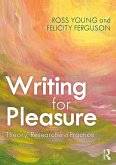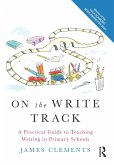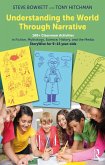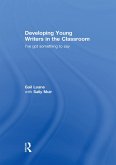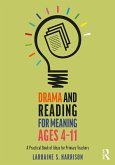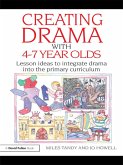Ross Young, Felicity Ferguson
Real-World Writers: A Handbook for Teaching Writing with 7-11 Year Olds (eBook, ePUB)
26,95 €
26,95 €
inkl. MwSt.
Sofort per Download lieferbar

13 °P sammeln
26,95 €
Als Download kaufen

26,95 €
inkl. MwSt.
Sofort per Download lieferbar

13 °P sammeln
Jetzt verschenken
Alle Infos zum eBook verschenken
26,95 €
inkl. MwSt.
Sofort per Download lieferbar
Alle Infos zum eBook verschenken

13 °P sammeln
Ross Young, Felicity Ferguson
Real-World Writers: A Handbook for Teaching Writing with 7-11 Year Olds (eBook, ePUB)
- Format: ePub
- Merkliste
- Auf die Merkliste
- Bewerten Bewerten
- Teilen
- Produkt teilen
- Produkterinnerung
- Produkterinnerung

Bitte loggen Sie sich zunächst in Ihr Kundenkonto ein oder registrieren Sie sich bei
bücher.de, um das eBook-Abo tolino select nutzen zu können.
Hier können Sie sich einloggen
Hier können Sie sich einloggen
Sie sind bereits eingeloggt. Klicken Sie auf 2. tolino select Abo, um fortzufahren.

Bitte loggen Sie sich zunächst in Ihr Kundenkonto ein oder registrieren Sie sich bei bücher.de, um das eBook-Abo tolino select nutzen zu können.
Real-World Writers will help teachers empower their pupils to write with pleasure and purpose, and with a sense of the relevance to their own lives beyond the classroom. These are vital ingredients for motivation and high achievement among young writers.
- Geräte: eReader
- ohne Kopierschutz
- eBook Hilfe
- Größe: 4.52MB
Andere Kunden interessierten sich auch für
![Real-World Writers: A Handbook for Teaching Writing with 7-11 Year Olds (eBook, PDF) Real-World Writers: A Handbook for Teaching Writing with 7-11 Year Olds (eBook, PDF)]() Ross YoungReal-World Writers: A Handbook for Teaching Writing with 7-11 Year Olds (eBook, PDF)26,95 €
Ross YoungReal-World Writers: A Handbook for Teaching Writing with 7-11 Year Olds (eBook, PDF)26,95 €![Writing for Pleasure (eBook, ePUB) Writing for Pleasure (eBook, ePUB)]() Ross YoungWriting for Pleasure (eBook, ePUB)26,95 €
Ross YoungWriting for Pleasure (eBook, ePUB)26,95 €![On the Write Track (eBook, ePUB) On the Write Track (eBook, ePUB)]() James ClementsOn the Write Track (eBook, ePUB)23,95 €
James ClementsOn the Write Track (eBook, ePUB)23,95 €![Understanding the World Through Narrative (eBook, ePUB) Understanding the World Through Narrative (eBook, ePUB)]() Steve BowkettUnderstanding the World Through Narrative (eBook, ePUB)23,95 €
Steve BowkettUnderstanding the World Through Narrative (eBook, ePUB)23,95 €![Developing Young Writers in the Classroom (eBook, ePUB) Developing Young Writers in the Classroom (eBook, ePUB)]() Gail LoaneDeveloping Young Writers in the Classroom (eBook, ePUB)30,95 €
Gail LoaneDeveloping Young Writers in the Classroom (eBook, ePUB)30,95 €![Drama and Reading for Meaning Ages 4-11 (eBook, ePUB) Drama and Reading for Meaning Ages 4-11 (eBook, ePUB)]() Larraine S. HarrisonDrama and Reading for Meaning Ages 4-11 (eBook, ePUB)20,95 €
Larraine S. HarrisonDrama and Reading for Meaning Ages 4-11 (eBook, ePUB)20,95 €![Creating Drama with 4-7 Year Olds (eBook, ePUB) Creating Drama with 4-7 Year Olds (eBook, ePUB)]() Miles TandyCreating Drama with 4-7 Year Olds (eBook, ePUB)29,95 €
Miles TandyCreating Drama with 4-7 Year Olds (eBook, ePUB)29,95 €-
-
-
Real-World Writers will help teachers empower their pupils to write with pleasure and purpose, and with a sense of the relevance to their own lives beyond the classroom. These are vital ingredients for motivation and high achievement among young writers.
Dieser Download kann aus rechtlichen Gründen nur mit Rechnungsadresse in A, B, BG, CY, CZ, D, DK, EW, E, FIN, F, GR, HR, H, IRL, I, LT, L, LR, M, NL, PL, P, R, S, SLO, SK ausgeliefert werden.
Produktdetails
- Produktdetails
- Verlag: Taylor & Francis eBooks
- Seitenzahl: 316
- Erscheinungstermin: 28. Mai 2020
- Englisch
- ISBN-13: 9781000074338
- Artikelnr.: 59539343
- Verlag: Taylor & Francis eBooks
- Seitenzahl: 316
- Erscheinungstermin: 28. Mai 2020
- Englisch
- ISBN-13: 9781000074338
- Artikelnr.: 59539343
- Herstellerkennzeichnung Die Herstellerinformationen sind derzeit nicht verfügbar.
Ross Young was a primary school teacher for 10 years and holds an MA in applied linguistics in education. As a passionate writer-teacher, he now works around the UK and abroad helping teachers and schools develop extraordinary young writers.
Felicity Ferguson was a primary school teacher for 40 years, working as an EAL specialist, SENCO, deputy and head teacher. A writer herself, she has MA degrees in applied linguistics and children's literature and has been involved in a number of literacy-based projects, particularly around children's reading development.
Felicity Ferguson was a primary school teacher for 40 years, working as an EAL specialist, SENCO, deputy and head teacher. A writer herself, she has MA degrees in applied linguistics and children's literature and has been involved in a number of literacy-based projects, particularly around children's reading development.
Part A
Preface
Chapter 1. Why Real-World Writing?
Chapter 2. How Real-World Writing Works
Chapter 3. Welcome Project: Setting Up Your Community Of Writers For The Year
Chapter 4. Will They Remember Writing It? How To Plan A Class Writing Project
Chapter 5. Teaching The Writing Processes
Chapter 6. How To Teach An Effective Writing Lesson: Using Writing Workshop
Chapter 7. Setting Up Writers' Notebooks & Personal Writing Projects
Chapter 8. Meeting Children Where They Are: Conducting Effective Pupil Conferences
Chapter 9. They Do The Hard Work So You Don't Have To: Marking & Target Setting
Chapter 10. Oh For Literature's Sake! How To Build Reading - Writing Connections
Chapter 11. Thinking Through Writing: Writing Across The Curriculum
Chapter 12. Assessing Your Writers
Chapter 13. Support For Early, Advanced And EAL Writers
Chapter 14. Growing A School Of Extraordinary Writers: Advice For Writing Coordinators
Chapter 15. A Guide To Becoming A Writer-Teacher
Chapter 16. Frequently Asked Questions And Answers To Them
Chapter 17. Terminology
Chapter 18. References & Further Reading
Part B
Chapter 19. Introduction To Part B
Chapter 20. Poetry
Chapter 21. Memoir
Chapter 22. Narrative
Chapter 23. Non-Fiction
Chapter 24. Persuading & Opinion
Chapter 25. History Genres
Index
Preface
Chapter 1. Why Real-World Writing?
Chapter 2. How Real-World Writing Works
Chapter 3. Welcome Project: Setting Up Your Community Of Writers For The Year
Chapter 4. Will They Remember Writing It? How To Plan A Class Writing Project
Chapter 5. Teaching The Writing Processes
Chapter 6. How To Teach An Effective Writing Lesson: Using Writing Workshop
Chapter 7. Setting Up Writers' Notebooks & Personal Writing Projects
Chapter 8. Meeting Children Where They Are: Conducting Effective Pupil Conferences
Chapter 9. They Do The Hard Work So You Don't Have To: Marking & Target Setting
Chapter 10. Oh For Literature's Sake! How To Build Reading - Writing Connections
Chapter 11. Thinking Through Writing: Writing Across The Curriculum
Chapter 12. Assessing Your Writers
Chapter 13. Support For Early, Advanced And EAL Writers
Chapter 14. Growing A School Of Extraordinary Writers: Advice For Writing Coordinators
Chapter 15. A Guide To Becoming A Writer-Teacher
Chapter 16. Frequently Asked Questions And Answers To Them
Chapter 17. Terminology
Chapter 18. References & Further Reading
Part B
Chapter 19. Introduction To Part B
Chapter 20. Poetry
Chapter 21. Memoir
Chapter 22. Narrative
Chapter 23. Non-Fiction
Chapter 24. Persuading & Opinion
Chapter 25. History Genres
Index
Part A
Preface
Chapter 1. Why Real-World Writing?
Chapter 2. How Real-World Writing Works
Chapter 3. Welcome Project: Setting Up Your Community Of Writers For The
Year
Chapter 4. Will They Remember Writing It? How To Plan A Class Writing
Project
Chapter 5. Teaching The Writing Processes
Chapter 6. How To Teach An Effective Writing Lesson: Using Writing Workshop
Chapter 7. Setting Up Writers' Notebooks & Personal Writing Projects
Chapter 8. Meeting Children Where They Are: Conducting Effective Pupil
Conferences
Chapter 9. They Do The Hard Work So You Don't Have To: Marking & Target
Setting
Chapter 10. Oh For Literature's Sake! How To Build Reading - Writing
Connections
Chapter 11. Thinking Through Writing: Writing Across The Curriculum
Chapter 12. Assessing Your Writers
Chapter 13. Support For Early, Advanced And EAL Writers
Chapter 14. Growing A School Of Extraordinary Writers: Advice For Writing
Coordinators
Chapter 15. A Guide To Becoming A Writer-Teacher
Chapter 16. Frequently Asked Questions And Answers To Them
Chapter 17. Terminology
Chapter 18. References & Further Reading
Part B
Chapter 19. Introduction To Part B
Chapter 20. Poetry
Chapter 21. Memoir
Chapter 22. Narrative
Chapter 23. Non-Fiction
Chapter 24. Persuading & Opinion
Chapter 25. History Genres
Index
Preface
Chapter 1. Why Real-World Writing?
Chapter 2. How Real-World Writing Works
Chapter 3. Welcome Project: Setting Up Your Community Of Writers For The
Year
Chapter 4. Will They Remember Writing It? How To Plan A Class Writing
Project
Chapter 5. Teaching The Writing Processes
Chapter 6. How To Teach An Effective Writing Lesson: Using Writing Workshop
Chapter 7. Setting Up Writers' Notebooks & Personal Writing Projects
Chapter 8. Meeting Children Where They Are: Conducting Effective Pupil
Conferences
Chapter 9. They Do The Hard Work So You Don't Have To: Marking & Target
Setting
Chapter 10. Oh For Literature's Sake! How To Build Reading - Writing
Connections
Chapter 11. Thinking Through Writing: Writing Across The Curriculum
Chapter 12. Assessing Your Writers
Chapter 13. Support For Early, Advanced And EAL Writers
Chapter 14. Growing A School Of Extraordinary Writers: Advice For Writing
Coordinators
Chapter 15. A Guide To Becoming A Writer-Teacher
Chapter 16. Frequently Asked Questions And Answers To Them
Chapter 17. Terminology
Chapter 18. References & Further Reading
Part B
Chapter 19. Introduction To Part B
Chapter 20. Poetry
Chapter 21. Memoir
Chapter 22. Narrative
Chapter 23. Non-Fiction
Chapter 24. Persuading & Opinion
Chapter 25. History Genres
Index
Part A
Preface
Chapter 1. Why Real-World Writing?
Chapter 2. How Real-World Writing Works
Chapter 3. Welcome Project: Setting Up Your Community Of Writers For The Year
Chapter 4. Will They Remember Writing It? How To Plan A Class Writing Project
Chapter 5. Teaching The Writing Processes
Chapter 6. How To Teach An Effective Writing Lesson: Using Writing Workshop
Chapter 7. Setting Up Writers' Notebooks & Personal Writing Projects
Chapter 8. Meeting Children Where They Are: Conducting Effective Pupil Conferences
Chapter 9. They Do The Hard Work So You Don't Have To: Marking & Target Setting
Chapter 10. Oh For Literature's Sake! How To Build Reading - Writing Connections
Chapter 11. Thinking Through Writing: Writing Across The Curriculum
Chapter 12. Assessing Your Writers
Chapter 13. Support For Early, Advanced And EAL Writers
Chapter 14. Growing A School Of Extraordinary Writers: Advice For Writing Coordinators
Chapter 15. A Guide To Becoming A Writer-Teacher
Chapter 16. Frequently Asked Questions And Answers To Them
Chapter 17. Terminology
Chapter 18. References & Further Reading
Part B
Chapter 19. Introduction To Part B
Chapter 20. Poetry
Chapter 21. Memoir
Chapter 22. Narrative
Chapter 23. Non-Fiction
Chapter 24. Persuading & Opinion
Chapter 25. History Genres
Index
Preface
Chapter 1. Why Real-World Writing?
Chapter 2. How Real-World Writing Works
Chapter 3. Welcome Project: Setting Up Your Community Of Writers For The Year
Chapter 4. Will They Remember Writing It? How To Plan A Class Writing Project
Chapter 5. Teaching The Writing Processes
Chapter 6. How To Teach An Effective Writing Lesson: Using Writing Workshop
Chapter 7. Setting Up Writers' Notebooks & Personal Writing Projects
Chapter 8. Meeting Children Where They Are: Conducting Effective Pupil Conferences
Chapter 9. They Do The Hard Work So You Don't Have To: Marking & Target Setting
Chapter 10. Oh For Literature's Sake! How To Build Reading - Writing Connections
Chapter 11. Thinking Through Writing: Writing Across The Curriculum
Chapter 12. Assessing Your Writers
Chapter 13. Support For Early, Advanced And EAL Writers
Chapter 14. Growing A School Of Extraordinary Writers: Advice For Writing Coordinators
Chapter 15. A Guide To Becoming A Writer-Teacher
Chapter 16. Frequently Asked Questions And Answers To Them
Chapter 17. Terminology
Chapter 18. References & Further Reading
Part B
Chapter 19. Introduction To Part B
Chapter 20. Poetry
Chapter 21. Memoir
Chapter 22. Narrative
Chapter 23. Non-Fiction
Chapter 24. Persuading & Opinion
Chapter 25. History Genres
Index
Part A
Preface
Chapter 1. Why Real-World Writing?
Chapter 2. How Real-World Writing Works
Chapter 3. Welcome Project: Setting Up Your Community Of Writers For The
Year
Chapter 4. Will They Remember Writing It? How To Plan A Class Writing
Project
Chapter 5. Teaching The Writing Processes
Chapter 6. How To Teach An Effective Writing Lesson: Using Writing Workshop
Chapter 7. Setting Up Writers' Notebooks & Personal Writing Projects
Chapter 8. Meeting Children Where They Are: Conducting Effective Pupil
Conferences
Chapter 9. They Do The Hard Work So You Don't Have To: Marking & Target
Setting
Chapter 10. Oh For Literature's Sake! How To Build Reading - Writing
Connections
Chapter 11. Thinking Through Writing: Writing Across The Curriculum
Chapter 12. Assessing Your Writers
Chapter 13. Support For Early, Advanced And EAL Writers
Chapter 14. Growing A School Of Extraordinary Writers: Advice For Writing
Coordinators
Chapter 15. A Guide To Becoming A Writer-Teacher
Chapter 16. Frequently Asked Questions And Answers To Them
Chapter 17. Terminology
Chapter 18. References & Further Reading
Part B
Chapter 19. Introduction To Part B
Chapter 20. Poetry
Chapter 21. Memoir
Chapter 22. Narrative
Chapter 23. Non-Fiction
Chapter 24. Persuading & Opinion
Chapter 25. History Genres
Index
Preface
Chapter 1. Why Real-World Writing?
Chapter 2. How Real-World Writing Works
Chapter 3. Welcome Project: Setting Up Your Community Of Writers For The
Year
Chapter 4. Will They Remember Writing It? How To Plan A Class Writing
Project
Chapter 5. Teaching The Writing Processes
Chapter 6. How To Teach An Effective Writing Lesson: Using Writing Workshop
Chapter 7. Setting Up Writers' Notebooks & Personal Writing Projects
Chapter 8. Meeting Children Where They Are: Conducting Effective Pupil
Conferences
Chapter 9. They Do The Hard Work So You Don't Have To: Marking & Target
Setting
Chapter 10. Oh For Literature's Sake! How To Build Reading - Writing
Connections
Chapter 11. Thinking Through Writing: Writing Across The Curriculum
Chapter 12. Assessing Your Writers
Chapter 13. Support For Early, Advanced And EAL Writers
Chapter 14. Growing A School Of Extraordinary Writers: Advice For Writing
Coordinators
Chapter 15. A Guide To Becoming A Writer-Teacher
Chapter 16. Frequently Asked Questions And Answers To Them
Chapter 17. Terminology
Chapter 18. References & Further Reading
Part B
Chapter 19. Introduction To Part B
Chapter 20. Poetry
Chapter 21. Memoir
Chapter 22. Narrative
Chapter 23. Non-Fiction
Chapter 24. Persuading & Opinion
Chapter 25. History Genres
Index
"There is much to commend in this readable, nicely illustrated guide... This book is a step in the right direction towards empowering teachers to give children autonomy as writers. It has the virtue of setting out a clear rubric for teaching, based upon largely sound principles."
- Francis Gilbert, Teaching English (NATE)
- Francis Gilbert, Teaching English (NATE)


